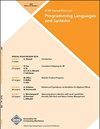Passport: Improving Automated Formal Verification Using Identifiers
IF 1.6
2区 计算机科学
Q3 COMPUTER SCIENCE, SOFTWARE ENGINEERING
引用次数: 8
Abstract
Formally verifying system properties is one of the most effective ways of improving system quality, but its high manual effort requirements often render it prohibitively expensive. Tools that automate formal verification by learning from proof corpora to synthesize proofs have just begun to show their promise. These tools are effective because of the richness of the data the proof corpora contain. This richness comes from the stylistic conventions followed by communities of proof developers, together with the powerful logical systems beneath proof assistants. However, this richness remains underexploited, with most work thus far focusing on architecture rather than on how to make the most of the proof data. This article systematically explores how to most effectively exploit one aspect of that proof data: identifiers. We develop the Passport approach, a method for enriching the predictive Coq model used by an existing proof-synthesis tool with three new encoding mechanisms for identifiers: category vocabulary indexing, subword sequence modeling, and path elaboration. We evaluate our approach’s enrichment effect on three existing base tools: ASTactic, Tac, and Tok. In head-to-head comparisons, Passport automatically proves 29% more theorems than the best-performing of these base tools. Combining the three tools enhanced by the Passport approach automatically proves 38% more theorems than combining the three base tools. Finally, together, these base tools and their enhanced versions prove 45% more theorems than the combined base tools. Overall, our findings suggest that modeling identifiers can play a significant role in improving proof synthesis, leading to higher-quality software.护照:使用标识符改进自动正式验证
正式地验证系统属性是改进系统质量的最有效的方法之一,但是它的高手工工作量要求常常使它变得非常昂贵。通过学习证明语料库来合成证明来自动化形式验证的工具刚刚开始显示出它们的前景。这些工具是有效的,因为证明语料库包含了丰富的数据。这种丰富性来自于证明开发人员社区遵循的风格惯例,以及证明助手下强大的逻辑系统。然而,这种丰富性仍然没有得到充分利用,到目前为止,大多数工作都集中在架构上,而不是如何充分利用证明数据。本文系统地探讨了如何最有效地利用证明数据的一个方面:标识符。我们开发了Passport方法,这是一种通过三种新的标识符编码机制来丰富现有证明合成工具使用的预测Coq模型的方法:类别词汇索引、子词序列建模和路径细化。我们评估了我们的方法在三个现有基础工具上的丰富效果:ASTactic, Tac和Tok。在正面比较中,Passport自动证明的定理比这些基本工具中表现最好的多29%。结合Passport方法增强的三个工具自动证明的定理比结合三个基本工具多38%。最后,这些基本工具及其增强版本证明的定理比组合基本工具多45%。总体而言,我们的研究结果表明,建模标识符可以在改进证明综合方面发挥重要作用,从而获得更高质量的软件。
本文章由计算机程序翻译,如有差异,请以英文原文为准。
求助全文
约1分钟内获得全文
求助全文
来源期刊

ACM Transactions on Programming Languages and Systems
工程技术-计算机:软件工程
CiteScore
3.10
自引率
7.70%
发文量
28
审稿时长
>12 weeks
期刊介绍:
ACM Transactions on Programming Languages and Systems (TOPLAS) is the premier journal for reporting recent research advances in the areas of programming languages, and systems to assist the task of programming. Papers can be either theoretical or experimental in style, but in either case, they must contain innovative and novel content that advances the state of the art of programming languages and systems. We also invite strictly experimental papers that compare existing approaches, as well as tutorial and survey papers. The scope of TOPLAS includes, but is not limited to, the following subjects:
language design for sequential and parallel programming
programming language implementation
programming language semantics
compilers and interpreters
runtime systems for program execution
storage allocation and garbage collection
languages and methods for writing program specifications
languages and methods for secure and reliable programs
testing and verification of programs
 求助内容:
求助内容: 应助结果提醒方式:
应助结果提醒方式:


